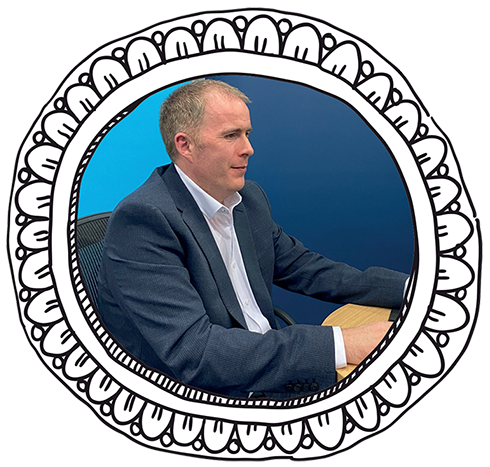Paul Arnold, deputy chief executive, Information Commissioner's Office, Wilmslow
When and why did you join the civil service?
 I joined the data protection registrar, now the Information Commissioner’s Office, 24 years ago. I started in customer-facing roles and developed a management leadership career that’s spanned everything from regulation to IT, to finance, to governance. I was drawn to a public service role; I wanted to do something where you could see the difference that you made for an organisation with a clear purpose. I’ve stayed so long because of the variety – it’s felt like I’ve changed employers several times because of the evolution of the use of data and information rights and the way the regulator has had to transform to keep pace.
I joined the data protection registrar, now the Information Commissioner’s Office, 24 years ago. I started in customer-facing roles and developed a management leadership career that’s spanned everything from regulation to IT, to finance, to governance. I was drawn to a public service role; I wanted to do something where you could see the difference that you made for an organisation with a clear purpose. I’ve stayed so long because of the variety – it’s felt like I’ve changed employers several times because of the evolution of the use of data and information rights and the way the regulator has had to transform to keep pace.
What did you do before?
I did a politics and history degree and I was pretty open minded as to what I did, which you could interpret as not having a clear idea of what I wanted to do next. I had a short career after university in customer service, and that helped me find direction – working for an organisation with a real purpose and a role in public life really helped me refine my thinking and work out what I wanted to do.
Tell us what you do and how it helps citizens
It’s to deputise for the information commissioner, who is a public appointee with a fixed term, in their capacity as chief executive. My role is responsible for the leadership and performance of the organisation. I have direct line management over a lot of our corporate and operational functions, but also a wider responsibility for the way the ICO organises itself, and the way our culture develops and the way we transform and change to keep pace with the society and economy that we regulate. It’s quite a broad role, everything from HR to legal services to finance to customer service, to risk governance.
“The pandemic was a phenomenal challenge but it was also an opportunity to evaluate the way we did things – I was determined that we wouldn’t just snap back to all of our business-as-usual habits”
How did your role change over the pandemic?
The pandemic was a phenomenal challenge but it was also an opportunity to evaluate the way we did things. I was determined that we wouldn’t just snap back to all of our business-as-usual habits, so in my role I took some time out to reflect on all of these things and to bring some of that learning and perspective back to the ICO. I felt a real responsibility to help steer the organisation through those tricky waters and come out the other side hopefully stronger for it, and having taken the opportunity to reflect on what it means for us all to be productive in our work.
What were some of things you were reflecting on?
I’ve got very severely impaired vision, and one thing I reflected on was the challenge of navigating some of the normal conventions of coming to work if you are visually impaired or have any other kind of impairment. There were lots of conventions that you had to conform to – like shaking somebody’s hand when you go into a meeting, for example – that I took for granted were a little bit stressful because you can’t quite judge those things. When you’re forced to work from home, all of those things disappear. They’re replaced by other challenges, but it made me examine what an inclusive workplace really meant. I’ve tried to use that to fuel a lot of the planning for our recovery from the pandemic. I’ve also been thinking about our office space. In an open-plan office, you would often have people sitting with their earphones in just to get some peace and quiet so they could do some focused work. Rather than the one-size-fits-all approach, it’s about understanding how we need to use workspaces to be as productive as possible.
This profile is part of a series looking at the huge diversity of people and roles that make up the modern civil service. Read more here